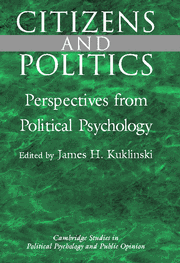Book contents
- Frontmatter
- Contents
- List of Contributors
- Prologue: Political Psychology and the Study of Citizens and Politics
- PART I AFFECT AND EMOTIONS
- PART II POLITICAL COGNITION
- PART III POLITICAL ATTITUDES AND PERCEPTIONS
- PART IV POLITICAL VALUES
- Introduction
- 13 Social Welfare Attitudes and the Humanitarian Sensibility
- 14 American Individualism Reconsidered
- 15 Political Value Judgments
- 16 Commentary: The Study of Values
- 17 Commentary: The Value of Politics
- Index
- Titles in the series
16 - Commentary: The Study of Values
Published online by Cambridge University Press: 07 October 2011
- Frontmatter
- Contents
- List of Contributors
- Prologue: Political Psychology and the Study of Citizens and Politics
- PART I AFFECT AND EMOTIONS
- PART II POLITICAL COGNITION
- PART III POLITICAL ATTITUDES AND PERCEPTIONS
- PART IV POLITICAL VALUES
- Introduction
- 13 Social Welfare Attitudes and the Humanitarian Sensibility
- 14 American Individualism Reconsidered
- 15 Political Value Judgments
- 16 Commentary: The Study of Values
- 17 Commentary: The Value of Politics
- Index
- Titles in the series
Summary
To the political scientist, the study of values represents an important challenge. On the one hand, the concept of citizen values has been used as a key component in theories of political behavior. On the other hand, it is not always clear exactly what is meant by values, how they differ from other kinds of political judgments, and exactly how to measure them. I will attempt to address these problems by presenting a working model of the study of values and by arguing that consideration of the components of this model can enhance the way values are used to explain political behavior. While I will draw from a number of sources, including my own research, a major source for many of the ideas comes from the chapters in this volume.
A value is a complex construct. From one perspective, values are considered to be attributes of a collective, that is, representing some shared norm, understanding, or view of the world (Hofstede, 1983; Triandis, Bontempo, Betancourt, and Bond, 1986), perhaps based on common experience (Inglehart, 1977). From another perspective, values have been located within individuals, and are associated with individual experiences and perceptions (Rasinski, 1987; Rokeach, 1973). I argue that both of these views must be considered in order to fully understand the role of values in political behavior. Even so, much research focuses on one or the other view.
- Type
- Chapter
- Information
- Citizens and PoliticsPerspectives from Political Psychology, pp. 469 - 479Publisher: Cambridge University PressPrint publication year: 2001

